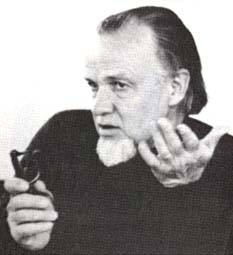
I am so stoked right now I found out that Desiring God is putting on a conference Sept 29-Oct 1 called "Above all Earthly Powers: Christ and Postmodernism" in Minneapolis. It of course will have Piper but also David Wells, Tim Keller, D.A. Carson and some other guy, its gonna be sooo tight! They have movie trailers for it if you want to check it out
click hereAnyway David Well's has a four book series that offers a superb investigation of cultural and evangelical postmodern trends, talking of the current overlap. Because I wandt to give people a taste for Wells (and let you get an idea why I am stoked about this conference) what follows is an interview with Wells on his most recent book "Above all Earthly Powers" with Eerdmans publishers.
INTERVIEW:1.
You open the book with a description of the tragic events of September 11, 2001. How do you see these terror attacks affecting the church in the postmodern world?
David Wells: For a few brief moments, we in the Church were wrenched away from our preoccupations with ourselves, with our own private, therapeutic needs, and we were confronted by an in-your-face act of evil. In fact, we were taken to school by reality! It was a sharp, painful encounter, like discovering, all too late, that one is walking across broken glass with bare feet.
Life in the Church, you see, is mostly about me, about what I find enjoyable, and what I need. Life in the world is often about what is wretchedly wrong, sometimes in ways that are ghastly, as was September 11.
It is hard to know whether evangelical faith was changed in any permanent way by this encounter. I think actually that it was a moment of embarrassing revelation. Surely evangelicals, the people of the Cross, would be those who know something about the reality of evil and God‘s way of conquering it through Christ‘s atonement. Surely, they would be to the fore in trying to explain this event to a bewildered and baffled nation? I wish I could say that light was shed on this tragedy in the numerous sermons I read subsequent to it, but, for the most part, I cannot. With a few exceptions, evangelicals, like everyone else, were left speechless and could only wring their hands. Ours is now a faith which is privately compelling but publicly irrelevant, to quote my friend Os Guinness. That is what I think we actually learn from September 11.
2.
One of the things that makes your survey of the rise of postmodernism unique is the way in which you argue that immigration has contributed to the rise of postmodernism in the United States. How do you see this happening?David Wells: What I have said is that immigration and the postmodern ethos of our time are two of the defining characteristics of this moment. However, the relation between these is many-sided and sometimes antagonistic.
There is no question that the combination of immigration and our media have made religious traditions that once were remote, far away, and even exotic, seem more ordinary and certainly more accessible today. To tap into Hinduism, we do not need to travel to India as so many did in the 1960s, like the Beatles. All we need to do is to look down the street to find some practicing Hindus. There are many in America who, as a result, are now raiding these religions and spiritual practices to build their own personal spiritualities. One of the current buzz words, for example, is ‘Metrospirituality.’ This is a Yuppie movement which is combining Eastern mysticism, from sources like Buddhism and Hinduism, and Western consumerism.
Respecting the environment means buying a hybrid car and respecting one's self means connecting with one's own inner power and they are putting this together in a single spiritual package — Jamba Juice, meditation, kindness, and aromatherapy all rolled into one! This kind of thing no longer seems strange to us because we have become the most religiously diverse nation in the world, with East meeting West in the supermarket, at the gas station, and everywhere on television.
At the same time, many of the immigrants who are coming to America are bringing with them quite traditional moral beliefs and ideas about the family, beliefs which derive from either Protestantism or Catholicism. These beliefs are often at odds with the way postmodern America thinks of family and morality. Will these new arrivals be able to preserve their beliefs or will they become lost in the great postmodern pot which threatens to melt every belief they have?
3. What do you see as the difference between popular postmodernism and academic or intellectual postmodernism?
David Wells: The difference is less in the ideas than in the degree of self-consciousness, and often the clarity, with which they are expressed.
However, there is a myth which needs to be laid to rest here. Intellectuals like to think that they are society's trend-setters, that what they are thinking is where reality is cresting. The result is that when intellectuals write about culture (and who else does?) they are inclined to see their ideas and their own culture as being in a cause-and-effect relation. They are the cause of which it is the effect.
In the modern period, however, this has rarely ever been the case. It is the culture, far more commonly, which gives the ideas their plausibility and which makes them seem inevitable. It is from the culture that ideas gain their traction and it is often because of the culture, when it changes, that they lose their traction. That is why, I believe, the Enlightenment ideology has lasted so long in the West and has become so deeply ensconced in our cultural elites, the gatekeepers, in academia, Hollywood, and many of our newspapers. The modernization of our society made Enlightenment ideas (like secular-humanism) seem inevitable, true, and incontrovertible. When this kind of public, cultural scaffolding began to shake in the 1960s, the ideas came tumbling down, leaving us with a void that the Enlightenment beliefs had once filled in our thinking. So we have come to be postmodern. For some, on one end of the intellectual scale, this is so in very cogent ways and for others, on the other end, it is so in ways that are more unthinking but nevertheless not any less real.
4.
Your strong critique of contemporary “seeker-sensitive” styles of worship will come as a surprise to evangelicals who see this kind of worship as necessary to bringing people into the church. What are the greatest dangers of uncritically accepting this kind of worship?
David Wells: You are certainly right that my critique will come as a surprise to many evangelicals because they have come to think that the seeker-sensitive approach is the only game in town. It is also the only thing they know. And certainly it is what has made many churches big and important. These evangelicals also reject the alternative which they think of as being backward, obsolete, traditional, aging, not with-it, failing to reach a new generation, and therefore doomed to inevitable decline and irrelevance. I think these are false alternatives. I offer no brief for failing traditional churches which deserve to fail, but I hold out no hope for all of these trendy players in the church who are going to end up empty-handed. The inescapable fact is that the culture is offering just about everything that one can find in these churches but without all the inconveniences of having to be religious.
This experiment in doing church is already a demonstrable failure. Barna, who is both its architect and its chronicler, has demonstrated its failure. Week-by-week, his polls show that born-againers, so many of whom inhabit churches that are in the sensitive-mode, are biblically illiterate, live no differently from the secular and, in fact, only 9% have anything like a worldview (by which he means the most minimal set of Christian beliefs which inform the way they see life). He predicts that in five years the evangelical movement will be gone. Not even I have gone so far out on that kind of limb! He also predicts that within a few years, 50% of the churches will have melted away. Instead (and Barna thinks this is really great!) people will be following the current cultural mode of being spiritual but not religious, meaning that they will divest themselves even further of doctrinal belief and corporate involvement in a local church. Talk about a recipe for suicide!
Here will be the graveyard of evangelical faith and we are being led, step by step, into it by our oh-so-sensitive, trendy, with-it pastors. Taking us there has made them famous as they have become C.E.O.'s of big church enterprises, but the price of their fame and fortune is the bankruptcy of the faith, not by their overt heterodoxy but by their practice.
The fact is that Christ is not up for sale. His message is not in the marketplace begging for takers. And those pastors who so prostitute themselves will find that the faith they no doubt hold dear has slipped from between their fingers. Here is a paradox that neither the earlier Protestant liberals nor many of our currently sensitive evangelical pastors appear to have grasped: Christian faith which makes absolute truth claims, and demands a commitment which matches this absoluteness, against all cultural odds, thrives; Christian faith which mutes its truth claims in order to fit in, and dilutes the commitment it asks for in order not to be off-putting, is doomed. The issue here is not traditional versus contemporary. The issue is authentic versus inauthentic. It is historic Christian believing versus its remnants, its pale imitations, in the hands of these pragmatists.
5.
Are there any benefits to it?David Wells: Not too many that I can think of.
6.
What do you envision a church that's being faithful to the gospel to look like in the twenty-first century?David Wells: We make a great mistake in thinking that the only thing that counts in the life of a local church is its form. That is, what it looks like and sounds like. Do we have the latest technology? Is our screen big enough? Do we have a food court? Do we meet at times which don‘t get in the way of people enjoying their weekend? Have we eliminated all the things that offend them like pulpits, crosses, hymn books, and pews? Do we have music that is inspirational, contemporary, and makes us feel good? Are our singers professional enough? Is the parking lot larger than we need? Do people leave the church feeling happy like they do when they go back to their hotel rooms from Disneyland? These are all the parts of the gnat with which we are straining while there is a massive camel which we have already swallowed.
So, what is it? The camel is the fact that we have, unbeknownst to us, taken on board ideas that are inimical to biblical faith. What do I mean?
In the West, we are moving ever deeper into a pagan mindset and that mindset is producing our postmodern culture and its public forms. For a church to go along with this set of assumptions in order to get along, and to get along in order to be successful, all too often results in a hybrid which unwittingly embraces pagan elements (such as the way in which the current cultural disposition to be spiritual but not religious is usually being worked out). Is this really what we should be doing? Surely, in what we think and do, in the way we live and act, we should be expressing what the alternative is to our increasingly paganized culture.
The issue is far less what we do (do we have drums and PowerPoint or organs and robes?) than in who we are. In our church, we need to be articulating a worldview that has the triune God at the center, which has truth as its directive and sustenance, and which is fleshed out in a joyously countercultural life wherever a moral and intellectual over-againstness is called for. What this means is that in this church we will remain sinners and never become consumers, we will recover a moral view of life in place of the therapeutic view which our postmodern culture palms off on us, we will devote ourselves to what is enduringly right and will reject all forms of relativism, and we will be asking, not what the church can do for us, but what we can do for Christ in the church and in our broken world.
It is all about substance, not style; all about who we are as people who are owned by Christ, not so much about what it looks and sounds like. It is about turning our backs on the superficial and trendy and turning our lives toward him who is eternal and enduring. The situation today is that if you really want to see what is superficial and trendy, go and find a successful evangelical church. If you want to see the most artful, pandering practitioners of the therapeutic (what Christina Hoff Summers had in mind in her book, ‘One Nation Under Therapy: How the Helping Culture is Eroding Self-Reliance’) go and find an evangelical church, almost any one, and you will find it, all out in the front, all quite shameless, as if this is what the apostles had in mind when they thought about the meaning of Christian faith! These things should not be.
Evangelical churches should be the places where we find an alternative way to thinking about our world and living in it, one which in its profundity is a reflection of the God who is incomparable, not a threadbare mimicry of the culture. We should find an understanding of life that is on the same scale, morally and spiritually, as the life we encounter in the workplace and hear about in the evening news. Today, evangelical churches are more often like little pygmies who are living in a land of giants, always trying to get into their game, pretending that they, too, are giants. They are not. The time for pretense is over; reality is now at hand.
7.
So, what kind of future do you see for evangelical faith here in America?David Wells: The fact is that Christianity is fleeing the West; it is only the reason for this of which we may be unsure. That it is so is indisputable, as Philip Jenkins has shown in his book, ‘The Coming Christendom.’ Not only is Christian faith burgeoning outside the developed West, but inside the West it is declining — catastrophically in Europe, less so in America. Christian faith of a biblical kind has found it remarkably difficult to sustain itself in the midst of modernized, postmodern cultures, all of which have, in varying degrees, eviscerated it.
The gates of hell will not prevail against the Church. That is a given. But that does not mean that God the Holy Spirit will not seriously move outside the West to build Christ‘s church. Indeed, he is doing so! Unless American evangelicals change their ways and repent of their worldliness, that is exactly what I expect will happen more and more in the future, and we will find that numerically speaking, the evangelical churches will become a shadow of what they once were.
I go to Africa every year because I serve on the board of a Christian foundation which is building orphanages for children, most of whom have been left behind by AIDS. I am always struck by this paradox, if that is what it is. Here in America we have everything, but despite everything we have (Bibles, church buildings, theological education, colleges, money, know-how), the evangelical church is weak and stumbling. In Africa, amidst great poverty and disease, illiteracy and deprivation, rampant independency and woeful alliances with traditional African religions, there is still to be found courage, vibrancy, and a Christian testimony to the truth of God that is striking by Western standards. Let us not forget who saved the Church of England from their pathetic willingness to capitulate to the homosexual agenda. It was the African bishops, not those from America or Europe! God, you know, does not have his hands tied simply because we in America have all the money!
8.
How does this book relate to the others in this series — No Place for Truth, God in the Wasteland, and Losing Our Virtue?David Wells: These three books and my current one are all an outgrowth to a wonderfully generous Pew Charitable Trusts grant which Mark Noll, Cornelius Plantinga, and myself received to explore the question as to why theology has deserted the evangelical church. My book for this project,
No Place for Truth, was my answer to that question, and it became the first in a series that I was to write.
It struck me while I was working on that volume that what I was also doing was a bit of ground clearing that resembles what happens in a systematic theology under the general heading of Prologomena. This was a Prologomena, not of a typically theological kind, but one that was more cultural. Here were the things we need to understand about our culture so that our own more specifically theological work will not be swallowed up in cultural habits and, in fact, will speak to it with the kind of relevance that takes its measure on eternity rather than on what is culturally fascinating but nevertheless transient.
I then followed this up by doing the same thing in relation to the doctrine of God in my second book, the human being as created and fallen in the third book, and the person and work of Christ in this, my most recent book. So, what I have been doing is following, in my own rather unconventional way, the kind of sequence that we see in a typical theology: Prologomena, God, human nature, and the person and work of Christ.
In this final volume, I have said that it is the last of the series, though I am going to write a final, final summary volume of all four books next year. Beyond that, what I am thinking I will do is to break out some of the practical themes that now call for more attention. I would like to begin by doing a volume on preaching but it will be quite different from what most books on preaching are like. The most important thing to know about preaching is that it arises legitimately only from God's Word, which is the resource of Truth given to the Church. In the West, the Church is living in a postmodern context in which there is no Truth, only ‘truths;’ no moral norms, only preferences; no Virtues, only values which we then go on to treat in a value-free way.
Preaching, therefore, is the principal way by which God secures our cognitive and behavioral distance from our fallen culture while securing our identity with his moral character and his redemptive purposes. This is something quite different from what we expect to hear today from the plexiglass stands that have taken the place of pulpits in so many evangelical churches. I am right about this, aren't I?






















